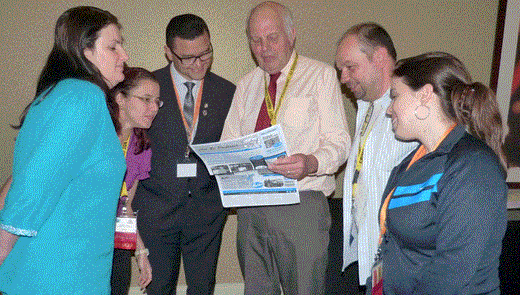
International Veterinary Forensic Science Association Meeting in Florida
Share
The Fourth Annual Conference of the IVFSA (International Veterinary Forensic Science Association) was held in Orlando, Florida, USA, from Wednesday 21st to Friday 23rd May. Speakers from several countries - all of them professionals involved in forensic science, human or veterinary medicine and animal protection - presented papers and discussed casework, research, the welfare and conservation of captive and free-living animals and links between human and animal health and wellbeing.

Nearly 120 people attended the Conference, the majority of these from the USA but also a sizeable contingent from 17 other countries.
The two Keynote Speakers at this Conference were a husband-wife/veterinary surgeon/lawyer team - Professor John E Cooper, Haith's Veterinary Advisor, and Mrs Margaret E Cooper.
Margaret spoke on "The wildlife law framework - A multinational perspective" and explained the international, regional and national legislative background to forensic work relating to animals. She also introduced, in general terms, the regulatory provisions that apply to the presentation of forensic evidence.
John's topic was "Murders, maggots and magistrates; the need for a comparative and international approach to veterinary forensic science". He emphasised the growing international importance of forensic work in veterinary medicine, in both rich and poor countries, and the need for the profession to orientate its thinking appropriately. He further stressed the need for a comparative approach, covering the whole Animal Kingdom and both captive and free-living species, if the practice of veterinary forensic medicine is to contribute fully to the legal process and to justice.
John included in his presentation a section on the laboratory examination of foodstuffs, including those intended for animals. This was essential if contaminants and adulterants were to be detected and the products were to prove both nutritious and safe. He referred to Haith's QC (quality control) programme for its bird diets and explained why the in-house and laboratory testing performed each month on Haith's products are important in terms of promoting avian health, welfare and conservation and in protecting both birds and humans. The topic attracted considerable interest. In this picture (ATTACHED), taken after the lecture, veterinarians from Brazil, some of them involved in food safety and other public health issues, are seen admiring the latest "Haith's Times" and asking about the QC work performed by John
The two Keynote Speakers at this Conference were a husband-wife/veterinary surgeon/lawyer team - Professor John E Cooper, Haith's Veterinary Advisor, and Mrs Margaret E Cooper.
Margaret spoke on "The wildlife law framework - A multinational perspective" and explained the international, regional and national legislative background to forensic work relating to animals. She also introduced, in general terms, the regulatory provisions that apply to the presentation of forensic evidence.
John's topic was "Murders, maggots and magistrates; the need for a comparative and international approach to veterinary forensic science". He emphasised the growing international importance of forensic work in veterinary medicine, in both rich and poor countries, and the need for the profession to orientate its thinking appropriately. He further stressed the need for a comparative approach, covering the whole Animal Kingdom and both captive and free-living species, if the practice of veterinary forensic medicine is to contribute fully to the legal process and to justice.
John included in his presentation a section on the laboratory examination of foodstuffs, including those intended for animals. This was essential if contaminants and adulterants were to be detected and the products were to prove both nutritious and safe. He referred to Haith's QC (quality control) programme for its bird diets and explained why the in-house and laboratory testing performed each month on Haith's products are important in terms of promoting avian health, welfare and conservation and in protecting both birds and humans. The topic attracted considerable interest. In this picture (ATTACHED), taken after the lecture, veterinarians from Brazil, some of them involved in food safety and other public health issues, are seen admiring the latest "Haith's Times" and asking about the QC work performed by John
Written by Professor Cooper.
